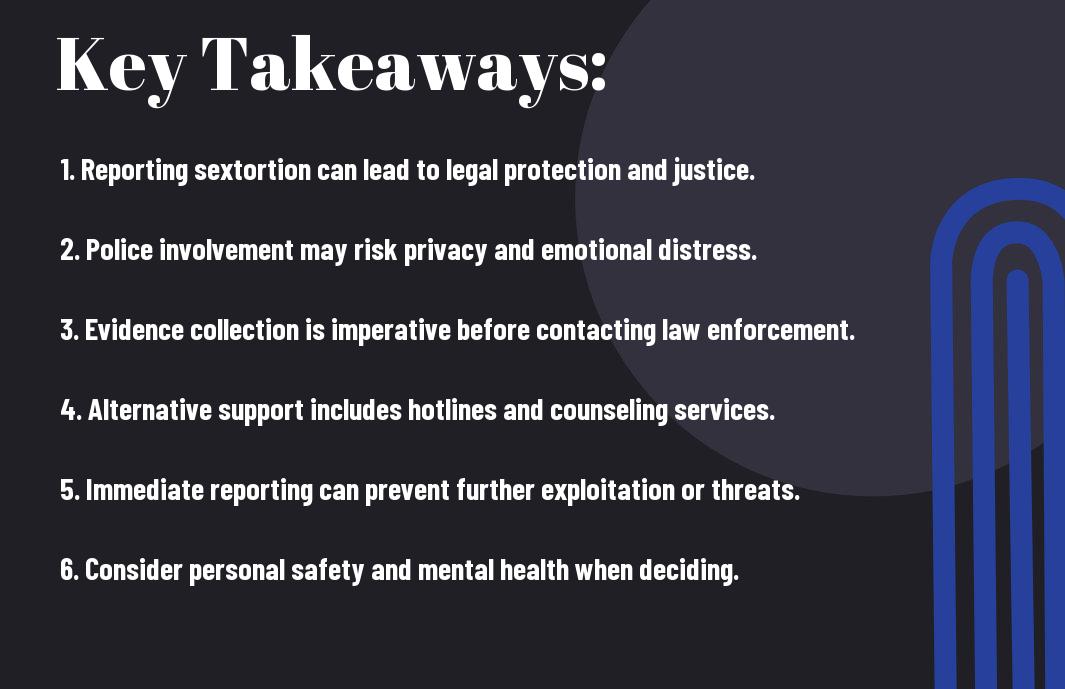Most individuals facing sextortion grapple with the decision of whether to report the crime to the police. While involving law enforcement can lead to potentially stopping the perpetrator and seeking justice, it may also bring about privacy concerns and emotional distress. Understanding the pros, cons, and viable alternatives can guide you in making a decision that aligns with your circumstances and well-being. In this post, we will explore your options, ensuring you have the information needed to take the best course of action for your situation. After going through this sextortion reporting guide visit Digital Forensic Squad for further assistance on the reporting process.
Key Takeaways:
- Evaluating the potential impact of reporting sextortion to law enforcement is important; it may provide a sense of empowerment but can also lead to unintended consequences, such as further victimization or exposure.
- Consider alternative options like reaching out to trusted friends, counseling services, or online support groups, which can provide emotional support and guidance without the pressures of formal legal action.
- Be aware of the limitations and resources available in your jurisdiction, as different regions may have varying levels of law enforcement response and legal protections regarding online exploitation and sextortion cases.
Understanding Sextortion
To grasp the seriousness of sextortion, it’s vital to recognize it as a form of sexual exploitation, whereby individuals are coerced into providing sexual images or engaging in sexual acts through threats of exposure or harm. The perpetrators often manipulate their victims using digital platforms, creating a web of fear and shame that can be difficult to navigate. Knowing the nature of sextortion can empower you to make informed decisions about how to respond if you find yourself in such a situation.
Definition and Mechanisms
Below, sextortion is defined as a manipulative tactic where someone threatens to share your private images or information unless you comply with their demands. This coercion often occurs online, leveraging technology to instill fear. Understanding these mechanisms can help you identify when you or someone else may be vulnerable to such exploitation, providing clarity on how to protect yourself.
Psychological Impact on Victims
Impact of sextortion can be devastating, leading to feelings of shame, fear, and helplessness. Victims often experience anxiety and depression as a result of the threats posed against them. These emotional tolls can disrupt your daily life, affecting relationships and self-esteem.
Sextortion can leave lasting psychological scars, manifesting as intense feelings of shame, profound anxiety, and persistent depression. Victims may find it extremely challenging to navigate their everyday lives, as the constant fear of exposure weighs heavily on their mental health. The manipulation and control exerted by perpetrators can lead you to feel isolated and vulnerable, further exacerbating feelings of hopelessness. It is important to seek support and recognize that you are not alone in facing these struggles.

Pros of Reporting to Police
Even though it may feel intimidating, reporting sextortion to the police can provide significant benefits. By doing so, you are taking a stand against this heinous crime and may help others who are also targeted. Law enforcement can investigate the situation more thoroughly, potentially leading to the identification and arrest of the perpetrator. This not only seeks justice for you, but also contributes to a broader culture of accountability around sexual exploitation.
Legal Consequences for Perpetrators
Across jurisdictions, laws are in place to combat sextortion and similar crimes. When you report, you enable law enforcement to impose legal consequences on the perpetrator, which might deter them from exploiting others in the future. The criminal justice system can pursue charges that lead to fines or imprisonment, emphasizing the seriousness of these offenses.
Potential for Prevention and Awareness
Along with addressing your case, reporting sextortion can enhance public awareness of this issue, prompting widespread discussions on prevention strategies. By bringing this crime to light, you play a key role in encouraging law enforcement and community organizations to spread information about sextortion, potentially safeguarding others from similar experiences.
With your report, police can develop awareness programs highlighting the dangers of sextortion, reinforcing strategies to identify, report, and prevent such incidents. By sharing your experience, you contribute to public discourse that raises awareness and develops protective measures. This proactive approach helps others stay informed and better prepared to handle potential threats, ultimately fostering a safer environment for the community as a whole.
Cons of Reporting to Police
Unlike some crimes, reporting sextortion to the police can come with significant drawbacks. You may face lengthy investigations that provide little immediate relief, and law enforcement may lack the resources or expertise to handle online crimes effectively. Additionally, it can expose you to further emotional distress, as the process may involve recounting traumatic experiences and delving into personal details.
Fear of Not Being Taken Seriously
Being a victim of sextortion can leave you feeling vulnerable and uncertain about how authorities will respond. You might worry that your case won’t be taken seriously, especially if the officer assigned lacks experience in dealing with digital crimes. This fear can deter you from seeking help altogether.
Possible Victim Blaming and Stigma
Fear of being judged or shamed might prevent you from reporting sextortion to the authorities. You may worry that others will blame you for the situation, questioning your choices or actions, which can lead to further isolation and distress.
For instance, when you share your experience with law enforcement, some may unintentionally perpetuate a stigma by implying that you brought this upon yourself. This can make you feel ashamed or guilty instead of empowered to seek justice. Even if you are a victim, societal attitudes can lead to victim blaming, making you hesitate to come forward. It’s important to navigate these feelings while considering how they may influence your decision on whether or not to report the crime.

Alternative Reporting Options
Now, if you are hesitant to report sextortion to the police, there are alternative options available that you can consider. Depending on the severity of the situation and your comfort level, you might find support through hotlines, counseling services, or online reporting platforms that cater specifically to victims of sexual exploitation. These avenues sometimes provide a more discreet and supportive environment for you to explore your options and find the help you need.
Support Hotlines and Counseling Services
One effective way to seek help for sextortion is to reach out to support hotlines and counseling services. These resources are staffed by trained professionals who understand the complexities of your situation, offering a safe space for you to discuss your feelings and options. They can provide guidance, emotional support, and connect you to additional resources that may enhance your well-being.
Online Reporting Platforms
Support platforms exist specifically to help you report sextortion safely and anonymously. These online services allow you to share your experience without the pressure of face-to-face interaction, making it easier for you to express your concerns comfortably. They can connect you with legal resources, law enforcement, or mental health professionals while ensuring your identity and information remain protected. Tools like these can help you take proactive steps against the perpetrator while maintaining your safety and anonymity throughout the process.
Platforms that specialize in online reporting are designed with your safety in mind. They provide user-friendly interfaces that make it easy for you to submit information and recount your experiences. Furthermore, these platforms often offer features such as confidential chat options and in-depth resources tailored to address sextortion specifically. While there might be limitations when compared to police reports, online platforms remain a valuable option for you to seek help without feeling overwhelmed by traditional reporting methods.
Legal Framework Surrounding Sextortion
Many individuals facing sextortion often grapple with understanding the legal environment surrounding their situation. Sextortion, a blend of cybersecurity and sexual exploitation laws, is increasingly being recognized across jurisdictions. Each country may have distinct legal parameters defining the crime, particularly in areas like consent, online conduct, and blackmail, that you should familiarize yourself with to understand your rights and protections.
Current Laws and Regulations
Against the backdrop of traditional laws, many regions have begun to incorporate specific statutes addressing sextortion. These laws typically classify the act as a form of extortion or sexual exploitation, offering victims various legal recourses. However, enforcement can differ significantly, and you may find that local regulations vary in terms of severity and response capabilities.
Recent Developments in Legislation
By acknowledging the increasing prevalence of sextortion, lawmakers are attempting to update and refine existing statutes. Many jurisdictions are now considering or have implemented laws that not only criminalize sextortion itself but also protect victims from further victimization during the investigative process.
Considering the rapid evolution of technology and its role in sextortion, legislators are responding with new measures aimed at strengthening protections for victims. These initiatives often focus on enhanced penalties for perpetrators and more comprehensive guidelines for law enforcement in handling such cases. You should stay informed about these developments, as evolving laws can provide you with better resources and support when navigating the complexities of sextortion.
Resources for Victims
For those affected by sextortion, various resources are available to provide support and assistance. Organizations and hotlines can help you understand your options, provide counseling, and connect you with necessary legal support. It’s important to reach out and access the help you need to navigate this challenging situation.
Support Groups and Organizations
Between local and national networks, numerous support groups exist specifically for sextortion victims. These organizations offer a safe space where you can share your experiences and feelings, connect with others in similar situations, and receive guidance from professionals who understand the complexities of sextortion. Engaging with these groups can help empower you to take the necessary steps toward recovery.
Educational Materials
Below, you will find a range of educational materials designed to inform you about sextortion and its implications. These resources provide insights into recognizing the signs, protecting yourself online, and understanding legal rights.
This collection of educational materials includes guides, articles, and videos that help you navigate the challenges associated with sextortion. You will learn about preventative measures to safeguard your online presence and the signs to watch for that indicate you may be a target. Additionally, the materials offer valuable information on legal recourse, enabling you to make informed decisions regarding reporting and seeking justice. By utilizing these resources, you can better equip yourself to address the situation effectively.
Final Words
Taking this into account, reporting sextortion to the police can be a significant step in addressing the issue, but it’s important to weigh the pros and cons. You need to consider your emotional well-being and the potential impact on your life. If you’re uncertain about police involvement, exploring alternatives such as seeking support from hotlines or counseling services can be beneficial.
Q: What are the potential downsides to reporting sextortion to the police?
A: There are several potential drawbacks to consider when deciding whether to report sextortion. Victims may fear retaliation from the perpetrator, especially if they know the victim’s identity. Additionally, there may be feelings of shame or embarrassment associated with the situation, making it hard to come forward. Lastly, some victims might worry that law enforcement will not take their case seriously, leading to further frustration or discouragement.
Q: What alternatives exist for victims of sextortion if they choose not to report to the police?
A: If victims decide against involving law enforcement, there are several alternative resources available. They can seek support from local or online organizations that specialize in handling sexual exploitation cases, offering counseling and legal advice. Reaching out to trusted friends or family members for support can also be beneficial. Additionally, victims can document the threats and preserve evidence, as it may be helpful later if they choose to report the situation or pursue other action.
Resources :
1. Archived: Sextortion: It’s more common than you think.

